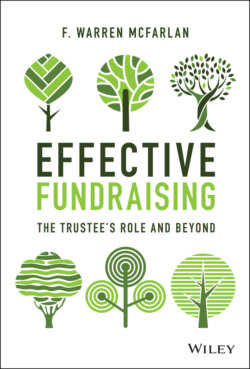Читать книгу Effective Fundraising - F. Warren McFarlan - Страница 6
Foreword
ОглавлениеSHORTLY AFTER GRADUATING from business school, I launched Global Citizen Year, the nonprofit social enterprise I've grown and led since 2010. At Global Citizen Year, we're pioneering a new pathway between high school and college—one that wraps coaching and curriculum around real-world experience, to unlock curiosity, conviction, and courage in our next-generation leaders. From the beginning, a core pillar of our mission has been to ensure access to exceptional young people who reflect our society's diversity. This commitment has required a significant need for philanthropy which, as Warren McFarlan so aptly notes, has meant over half my time (and, yes, “the harder half”!) has been focused on fundraising. To date, we've raised and deployed over $30 million in philanthropy. Of our 1,000 alumni, 80% have received some level of need-based financial aid and over 30% have participated on a fully funded scholarship.
None of this would have been possible without the commitment and engagement of my board. Along the way, I've learned a tremendous amount about how to support our trustees in supporting our mission, though much of what I've learned has been through trial and error. The beauty of Warren McFarlan's book is that it provides a blueprint for accelerating the learning curve for all of an organization's stakeholders.
This timely and practical book is a comprehensive guide for trustees—particularly those serving on the boards of well-established nonprofits with clear governance structures, broad networks of supporters, and a long history. These include colleges and universities, private schools, major hospitals, and arts institutions. For those interested in serving on the board of grass-roots or social-change organizations, Chapter 9 shares helpful advice about the role a board plays in supporting the unique challenges—and opportunities—of organizations that are younger, high-growth, and/or founder-led.
The book also outlines the broad range of roles trustees can play in contributing to the crucial function of fundraising. Time and again, I've found that people assume fundraising necessarily requires making direct asks, but this couldn't be further from the truth. While some (rare) souls are enthusiastic about directly soliciting gifts, others may prefer to play equally impactful roles—expanding networks, making introductions, lending credibility, or providing the coaching and context that contribute to a successful “close.”
As we've built the board at Global Citizen Year, I've made a point of spending time with each prospective trustee to discuss the role s/he would most like to play in generating resources for the organization. We expect everyone to make a contribution that feels generous according to each person's means (as Warren McFarlan says, “giving enough that it hurts”), but recognize that the specific amount looks different for everyone.
Additionally, I ask each board member to identify the fundraising role each would get energy from: is it hosting a cocktail party or “friendraiser”? Making warm introductions to new prospects? Designing a viral marketing campaign? Accompanying me to meetings in person or (as of this writing in the time of Coronavirus Covid-19) via ZOOM? The key to successful engagement, in my experience, is finding the sweet spot between what the organization needs and what you—as trustee—can distinctively offer. Once we've defined your role, my job as CEO is to keep you motivated and equipped to play it successfully.
One of the other things the book does so well is to debunk the myth that fundraising is the dirty work of begging for resources. McFarlan writes, “You are not begging, but rather offering an unusual and attractive opportunity to the prospective donor to invest in their passion and to have their name associated with it long term.” I couldn't agree more. My approach to fundraising changed fundamentally once I recognized that, to a high-net-worth individual looking to give away money, I was the one who brought the scarcer resource to the relationship—that is, a clear path to make a meaningful and distinctive impact in the world. No longer did I see myself pleading for support; instead I knew I was showing up with a valuable opportunity. This shift—along with the insight that the most successful fundraising must be relational, not transactional—has been a revelation for me, as well as for our board. Any time I hear a board member complain that they don't like asking for money, I remind them that it's a privilege to invite others to join us in a cause we believe in fiercely. This change in frame shifts the narrative from “I have to …” to “I get to …” and it makes a world of difference.
This book will help you find a cause you can't not do something about and a mission that, in the author's words, “you talk continuously about it to the point of driving people around you crazy.” Once you've found it, you can look the CEO and your fellow trustees in the eye and say, “I see you. I trust you. Let's do this. How can I help?” And, you're off to the races.
I wish this book existed when I set out to found Global Citizen Year, and I'm so glad it now does. There's no doubt it will be a valuable guide in driving the resources that advance the causes you care most about. Ultimately, it's not just about the cash—it's about bfringing the credibility, candor, compassion, and commitment that will change the world. For good.
Abby Falik
Founder/CEO
Global Citizen Year
